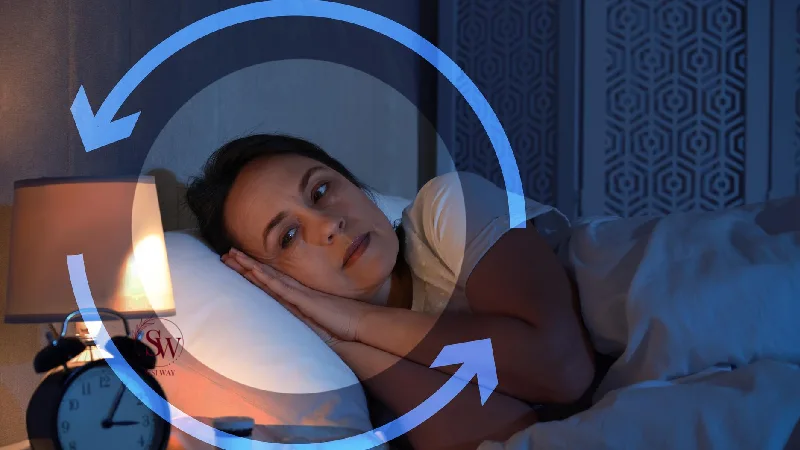How to Get 8 Hours of Sleep

How to Get 8 Hours of Sleep Every Night
In today’s fast-paced world, getting a good night’s sleep has become increasingly challenging for many individuals. However, prioritizing sleep is crucial for overall health and well-being. The recommended amount of sleep for adults is typically around 7-9 hours, with 8 hours often considered the sweet spot. In this article of sisiway, we will explore the importance of getting 8 hours of sleep and provide practical tips to help you achieve a restful night’s sleep.

-
Understand the Benefits of Adequate Sleep:
Getting a full 8 hours of sleep offers numerous benefits for both physical and mental health. It improves cognitive function, enhances memory retention, and boosts concentration and productivity throughout the day. Quality sleep also strengthens the immune system, promotes healthy weight management, and reduces the risk of chronic conditions such as heart disease and diabetes.
-
Establish a Consistent Sleep Schedule:
Establishing a consistent sleep schedule is crucial for ensuring a restful night’s sleep. Our bodies have an internal clock, known as the circadian rhythm, which regulates our sleep-wake cycle. By going to bed and waking up at the same time every day, even on weekends, we help synchronize this internal clock, making it easier to fall asleep and wake up naturally. Consistency in sleep schedule helps train our bodies to anticipate sleep, leading to improved sleep quality and overall well-being. It is recommended to choose a bedtime that allows for a full 8 hours of sleep and to stick to the schedule as closely as possible for optimal results.
-
Create a Relaxing Bedtime Routine:
Creating a relaxing bedtime routine can greatly enhance the quality of your sleep. Engaging in calming activities before bed helps signal to your body and mind that it’s time to unwind and prepare for rest. Whether it’s reading a book, practicing gentle stretching or yoga, taking a warm bath, or listening to soothing music, these activities can promote relaxation and reduce stress levels. By consistently following a bedtime routine, you can establish a sense of familiarity and signal to your body that it’s time to transition into sleep mode. This allows for a smoother and more peaceful transition into slumber, leading to a more restful and rejuvenating night’s sleep.

-
Optimize Your Sleep Environment:
Optimizing your sleep environment is essential for achieving a full 8 hours of sleep. Your bedroom should be a sanctuary dedicated to rest and relaxation. Start by ensuring your room is dark, quiet, and at a comfortable temperature. Consider using blackout curtains or an eye mask to block out any unwanted light, and use earplugs or a white noise machine to minimize noise disturbances. Additionally, invest in a supportive mattress and pillows that suit your preferences, as proper comfort and alignment are key for a good night’s sleep. Declutter your sleeping space to create a peaceful atmosphere, and remove any electronic devices that emit disruptive lights or sounds. By creating a sleep-friendly environment, you can optimize the conditions for a restorative and uninterrupted sleep, allowing you to reach the recommended 8 hours of sleep and wake up feeling refreshed.
-
Limit Stimulants and Napping:
Limiting stimulants and napping plays a crucial role in getting a full 8 hours of sleep. Stimulants like caffeine and nicotine can interfere with your ability to fall asleep and stay asleep. It’s advisable to avoid consuming these substances, especially close to bedtime. Instead, opt for soothing herbal teas or decaffeinated beverages. Additionally, alcohol may disrupt sleep patterns and cause fragmented and less restorative sleep, so it’s best to moderate its consumption. Furthermore, while napping can be beneficial for some individuals, it’s important to limit daytime napping, especially in the late afternoon or evening, as it can make it harder to fall asleep at night. By minimizing stimulants and regulating napping, you can optimize your chances of achieving a full 8 hours of uninterrupted and restful sleep.
-
Prioritize Physical Activity:
Prioritizing physical activity is a key factor in obtaining a full 8 hours of sleep. Regular exercise not only contributes to overall health and well-being but also promotes better sleep quality. Engaging in physical activity during the day helps expend energy, reduce stress levels, and improve mood, all of which can positively impact your sleep. However, it’s important to time your workouts appropriately. Avoid intense exercise close to bedtime, as it can have a stimulating effect on the body, making it harder to fall asleep. Instead, aim to incorporate moderate to vigorous exercise earlier in the day to allow your body enough time to wind down and transition into a restful state by bedtime. By making physical activity a priority and finding a balance in your exercise routine, you can enhance the likelihood of achieving a full 8 hours of rejuvenating sleep.
-
Manage Stress and Relaxation Techniques:
Managing stress and incorporating relaxation techniques are essential for achieving a full 8 hours of sleep. High levels of stress can negatively impact sleep quality and make it difficult to fall asleep or stay asleep throughout the night. To combat this, it’s important to incorporate stress management techniques into your daily routine. This can include practices such as meditation, deep breathing exercises, progressive muscle relaxation, or engaging in activities that bring you joy and help you unwind. By dedicating time to relax and calm your mind before bed, you can reduce stress levels and create a more peaceful state conducive to sleep. Prioritizing stress management and incorporating relaxation techniques into your routine can significantly improve the quality and duration of your sleep, allowing you to achieve the recommended 8 hours of restorative rest. Knowing how to manage stress and anxiety is a skill that not only helps with better and more restful sleep but also contributes to your overall physical and mental health.
-
Limit Screen Time Before Bed
Limiting screen time before bed is crucial for obtaining a full 8 hours of sleep. The blue light emitted by electronic devices such as smartphones, tablets, and computers can interfere with the body’s natural sleep-wake cycle. Exposure to this blue light suppresses the production of melatonin, a hormone that helps regulate sleep. Therefore, it’s essential to establish a digital curfew before bedtime. Aim to disconnect from screens at least an hour before bed, allowing your body to wind down and prepare for sleep. Instead, engage in activities that promote relaxation, such as reading a book, practicing gentle stretching, or enjoying a calming cup of herbal tea. By reducing screen time and avoiding the stimulating effects of electronic devices, you create a conducive environment for sleep, improving the chances of achieving a full 8 hours of restful sleep.
Importance Of Get 8 Hours of Sleep
Getting 8 hours of sleep is crucial for maintaining overall health and well-being. Adequate sleep is essential for various cognitive functions, including memory consolidation, learning, and problem-solving. When you get enough sleep, your brain can process information efficiently, leading to improved concentration, productivity, and mental clarity throughout the day.
Furthermore, sleep plays a vital role in regulating emotions and supporting mental health. Insufficient sleep can contribute to mood swings, irritability, and increased stress levels. Chronic sleep deprivation has been linked to an increased risk of developing mental health disorders such as depression, anxiety, and mood disorders. On the other hand, consistently getting a full 8 hours of sleep promotes emotional stability, enhances mood, and helps you better cope with daily stressors.
In summary, prioritizing 8 hours of sleep is essential for optimal physical and mental functioning. It supports cognitive processes, emotional well-being, and overall health, allowing you to lead a more productive, balanced, and fulfilling life.

FAQ
- How can I ensure I get 8 hours of sleep?
To achieve 8 hours of sleep, establish a consistent sleep schedule and prioritize it in your daily routine. Set a regular bedtime and wake-up time, even on weekends, and create a relaxing bedtime routine to signal your body that it’s time to sleep. Optimize your sleep environment, limit stimulants like caffeine, and avoid excessive screen time before bed.
- What if I have a busy schedule and struggle to get 8 hours of sleep?
If you have a busy schedule, make sleep a priority by adjusting your daily routine. Evaluate activities that may be stealing time from sleep and consider reallocating them. Set realistic goals and manage your time efficiently to ensure you have enough time for sleep. It may require reorganizing your schedule or making sacrifices in other areas to prioritize restful sleep.
- What if I have trouble falling asleep or staying asleep for 8 hours?
If you struggle with falling asleep or staying asleep for a full 8 hours, try implementing sleep-promoting strategies. Create a calming sleep environment, practice relaxation techniques before bed, and establish a consistent bedtime routine. Avoid stimulating activities or substances close to bedtime and seek professional help if sleep issues persist to address any underlying sleep disorders or conditions.
Conclusion:
Getting a consistent 8 hours of sleep is a vital component of a healthy lifestyle. By understanding the benefits of adequate sleep and implementing practical strategies like maintaining a sleep schedule, creating a soothing bedtime routine, and optimizing your sleep environment, you can improve the quantity and quality of your sleep. Prioritize your sleep, and reap the rewards of improved well-being, enhanced productivity, and overall better quality of life.



